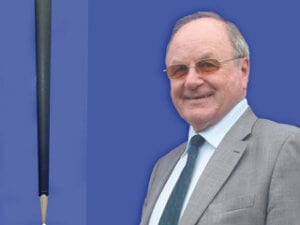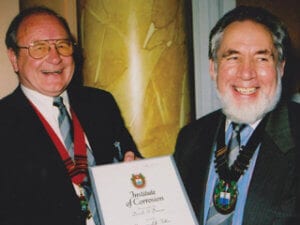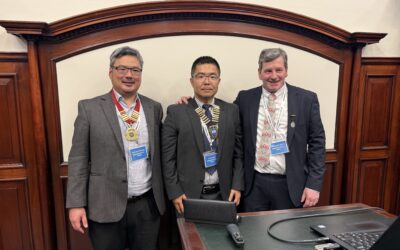24 October 1936 – 31 March 2017
It is with great sadness that we announce the death of David Deacon on 31st March 2017. David was a stalwart of the Institute, supporting it virtually all of his long working life. In recognition of his service, he was elected an Honorary Life Fellow in 1992, and as a mark of David’s continued significant and influential contributions to the Institute, he received the Lifetime Achievement Award, a unique decoration especially created for him (a report by John O’Shea on this is given in Corrosion Management no 87, January 2009). In 1976 he became the Technical Committee Chairman and Council member and was Chairman of Council from 1986-1988. He took on a part-time role as Honorary Secretary, became Vice-President (twice) and was President from 2002-2004. He also contributed to the work of London Branch between 2013-2015.

A more personal view of David’s life and contributions to the Institute is given below
People always wanted to know what the ‘H’ stood for. He always used the initial. But he never gave the name. So I asked him. ‘Humfrey’ he said (I didn’t learn about the spelling until much later). Turned out it was a family name, and way back one of the early holders had left a bequest to any of the male descendants who had it in their name. So David always kept it and always acknowledged it – and Wil (David’s son) has got it too – but it’s not spelled like a ‘regular’ Humphrey. There was always something unexpected about David.
For example, he’d been a Public Schoolboy – not many people knew that. And his Latin master christened him Praelatus(?) – because he was a ‘Deacon’ and therefore must be a prelate of some description. Evidently this chap had a Latin nickname for everyone in the school. DHD had been a good sportsman in his day – Played cricket for the County (Hampshire? Berkshire? I’m not sure) but was a very useful footballer too. And a life-long (not to say rabid) Reading supporter.
I first met him in about 1981. In court. I was supporting David Scantlebury on a seawater outfall (i.e. sewage) pipe job for Welsh Water. David was out for the contractor. We said the ultra high-build factory-applied coating was porous. David said it wasn’t. David won. He wasn’t right, but that didn’t matter. We looked like wet-behind-the-ears academics when it came to the court skirmish. We knew well that impedance tests had shown without doubt that the coating absorbed water and was porous. It shouldn’t have been accepted. Deacon said it was a perfectly good coating and there was nothing wrong with it. The judge believed him. I was hopping mad. I resolved never to let that happen to me again.
The next time I came across him it would be around 1986. I was going to the NACE Conference in Houston. NACE had developed a Coating Inspection Training and Certification Scheme and the UK Institute of Corrosion was interested in partnering to offer it in Europe. David Gearey (CAPCIS/UMIST) was my Director and he asked me to meet up with Deacon and help with the pitch to NACE. “He can kick on a bit”, said Gearey “But he may have calmed down these days”. I felt I’d just bitten into a sour plum.
Actually, Deacon was charming – and we were successful in convincing NACE to work with the Institute, which was excellent. He and C. Jay Steele, who was really the person behind the NACE CIT&CC, got on really well and that was the key. Deacon’s company, ITI, was also going hammer and tongs in Houston at the time – as well as in Singapore and across the Middle East, and in the UK he and Jackie (Deacon) were tremendous supporters of ICorr and the NACE/ICorr Joint Venture collaboration.
ITI had been grown out of a ‘moonlight flit’ from BIE (British Inspection Engineers). David had been heading up the Coatings Inspection activities, became frustrated with the management inertia and decided it was time to set up his own company. Jackie was his secretary and bailed out with him. I heard that BIE weren’t happy about it, but that was just too bad – Deacon was already away and pushing hard.
He’d started out at British Aluminium, and evidently prior to that he’d been employed as a young trainee in some kind of asbestos company. He told me recently of the trainees “throwing ‘snowballs’ (of asbestos fibres) at each other, and wiping the asbestos dust out of their mugs at tea break. I never did properly understand the background but he never went to University and didn’t have a degree, but he’d obtained a Diploma in Paint Technology and Polymer Chemistry. In certain respects, he was responsible for transforming the ‘high performance coatings and linings’ industry in the UK. He was very clear that there was all the difference in the world between ‘decorative paint’ and ‘high performance protective coatings and linings’. He accumulated a collection of world-class specialists and experts – Harry Bray, Gil Hill, Derek Bayliss, and between them they DEFINED what it takes to ensure good-quality surface preparation and proper application of a high-performance anti-corrosion coating. The book he wrote with Derek Bayliss (Steelwork Corrosion Control, Spon Press) is still the benchmark reference text for coating technology.
I was never clear why he was prepared to work so hard for the Institute of Corrosion. During the heyday of North Sea Oil development in the 70’s and 80’s he put huge effort into the Annual UK Corrosion Conference, which was the single most profitable activity that the Institute had at the time. Even when the ICorr was virtually bankrupted as a result of over-ambitious expenditure and poor management, Deacon was the one person who was still prepared to go and fight for it. Only Deacon had the confidence and commitment to oppose the claim of a former administrator for ‘unfair dismissal’. He won that case (for the Institute) too – but on that occasion he was absolutely correct.
He gave the Institute of Corrosion a home at the ITI office, initially rent free when there was no money in the ICorr bank account and under-wrote many of its activities until it could stand on its own financial feet once again and had Gillian (Inwood), his long-serving and faithful Secretary, field ICorr activities while employed by his own company. Four years later, there was £200,000 in the reserves and the Institute h as continued to prosper since that time. Subsequently, he worked with John O’Shea to enable the Institute to purchase its own premises – Corrosion House – though actually the mortgage could only be funded because SPC took the rest of the building. In the face of massive opposition, he first proposed the ICorr Corporate Sustaining Membership scheme – now responsible for generating around one-third of the ICorr annual income, and he instigated Correx – the commercial arm of ICorr, now responsible for the ICATS scheme a substantial proportion of ICorr training revenue.
as continued to prosper since that time. Subsequently, he worked with John O’Shea to enable the Institute to purchase its own premises – Corrosion House – though actually the mortgage could only be funded because SPC took the rest of the building. In the face of massive opposition, he first proposed the ICorr Corporate Sustaining Membership scheme – now responsible for generating around one-third of the ICorr annual income, and he instigated Correx – the commercial arm of ICorr, now responsible for the ICATS scheme a substantial proportion of ICorr training revenue.
I’ve really only worked closely with David on consultancy activities over the past ten years or so. Something came up in Saudi Arabia and I asked if he’d like to collaborate – he on the coatings aspects and I on the metallic corrosion issues. We were out in a storage area for new cars with a couple of guys form the British Geological Survey – right on the edge of the coast – and the sun was beating down. Being outside in an open area, we didn’t need hard hats, and being close to the sea there was a constant cooling breeze all day. It was only in the evening that we realised how much we’d caught the sun – especially David as his hair was thinning more than mine. The following day wasn’t much fun at all, though for one reason or another we just laughed all the time.
That set the style for our continuing to work together on an ad-hoc basis. He would ALWAYS drive, I’d look after the metallic corrosion and he’d deal with the coatings issues. It was just so much FUN! He could be extraordinarily compassionate and nursed his wife Hilary when she developed pancreatic cancer. It took a lot out of him, but the work – and the cats – were welcome diversions. There were so many contrasts – on the one hand he could be ruthlessly hard-nosed and, on the other, he could be ridiculously generous. He cared for his clients and his staff, though when he sold ITI he was less interested in the inspection side and concentrated more on consultancy activities while Wil took primary responsibility for the inspections business.
After the embargo was lifted he was happy to look at a job in Tripoli – partly to support a client and partly to try and give a little encouragement to the then fledgling Libyan democracy movement. He went to Jordan to look at a pipeline because he was sure that his client had been given poor advice from a contractor and he wanted to make sure the issue was resolved. Even when clearly starting to lose his health, he was prepared to take on a job in Abu Dhabi for the same client, just because he wanted to continue to support them, even though now he was in his late 70’s. Always in demand, he would drive through the night, or work through the night, looking at bridges for the Highways Agency (now Highways England). Old as he was, he was still the top coating consultant in the UK, and possibly world-wide, and the people who knew him were happy if he was prepared to take on their work.
The last trip I went on with him was to Ireland – Dublin. The visit and meeting went well enough, but we were finished early and there would be a four-hour wait for the flight. He wasn’t interested in hanging about at the airport. We took a flight back to Heathrow (or original reservation was for Luton), just to get back earlier on a Friday evening, even though we then needed a taxi to travel from Heathrow to Luton to collect our car. I couldn’t believe how keen he was to get home. He’d had enough. He never went on site again.
David turned 80 in October last. There was a party – just a small affair – family and a few old friends. He didn’t stay for the whole event but he was in good form and gave a nice little speech. He was still contributing to projects even up to January of this year – he wouldn’t go to site but he was pleased to talk through what was happening and even weak as he was he would still make a comment or suggestion that was pithy and pertinent – still saving his clients’ money. Deacon was part of the team that specified the coating for the Thames Barrier – now coming up to 40 years in service from a single-layer hot-applied system. Other ‘experts’ had said it was impossible. Deacon proved them wrong. Deacon was the person who ended the joke of ‘Painting the Forth (Rail) Bridge’. When he’d finished it wouldn’t need painting again for at least another 25 years. As we drove around the motorway network he would point out different projects he was responsible for – the Mersey Tunnel; the Dartford Crossing; Tower Bridge (London); the Tamar Bridge; the galvanized bridge on the A1 just South of Newcastle, a footbridge here, an equipment tower there, the Cutty Sark, oil storage tanks in the UK, Ireland and elsewhere around the world. He’d worked on railway viaducts in India, Nepal, Kuwait, and given coating training courses in every major industrialised country in the world – a massive infrastructure legacy that is more reliable and less expensive to operate after David Deacon had applied his expertise.
I needed a chat with Wil on the 22nd February about the Millau Viaduct and we arranged to meet at the house in Eggington – roughly mid-way between Wil’s house and mine. I knew David was getting closer to the end, he’d said goodbye at my previous visit, but when Wil and I had finished work for the day David said he’d like me to pop upstairs for five minutes. We got through the pleasantries and then attention turned to the meeting. As ever, he had two, maybe three comments that were directly relevant to the project. He hung on until the end of March. He’d been diagnosed the same day as Terry Wogan (in November 2015), he said, and he’d lived a full twelve months longer than Wogan. Not bad for a guy who was given 4-6 weeks and completely typical of a person who would just never give in.
It’s not very long since Jack Tighe passed away. David wanted to go to the funeral and I went along with him. The joke that day amongst the corrosion industry cognoscenti was that St. Peter needed the gates painted and Jack Tighe had obviously got the contract. It would appear that ‘Senior Management’ had decided to call Deacon in to do the independent inspection and ensure the work was done properly.
I’ve missed working with him this past few weeks/months and I know I’m going to continue to miss him, but I won’t forget the work we did together or the fun we had while doing it. Life was always interesting with David Deacon – you never quite knew what was going to happen next, but it was always worthwhile and it was always special. You KNEW he’d probably seen it a dozen times before and you could be confident that any recommendation he gave would be sound and reliable. As with all individuals who are completely fluent in their subject area, he would tell you anything you wanted to know, and he would still know twice/three times what you knew about it when he’d told you anything he thought might be relevant. The Institute of Corrosion has lost a dedicated servant and supporter, his clients have lost a friend and a mainstay, and I have lost a close friend and colleague. There aren’t many in the world who command the kind of respect that David H. Deacon enjoyed. He really was quite a boy. RIP 31/03/2017.



